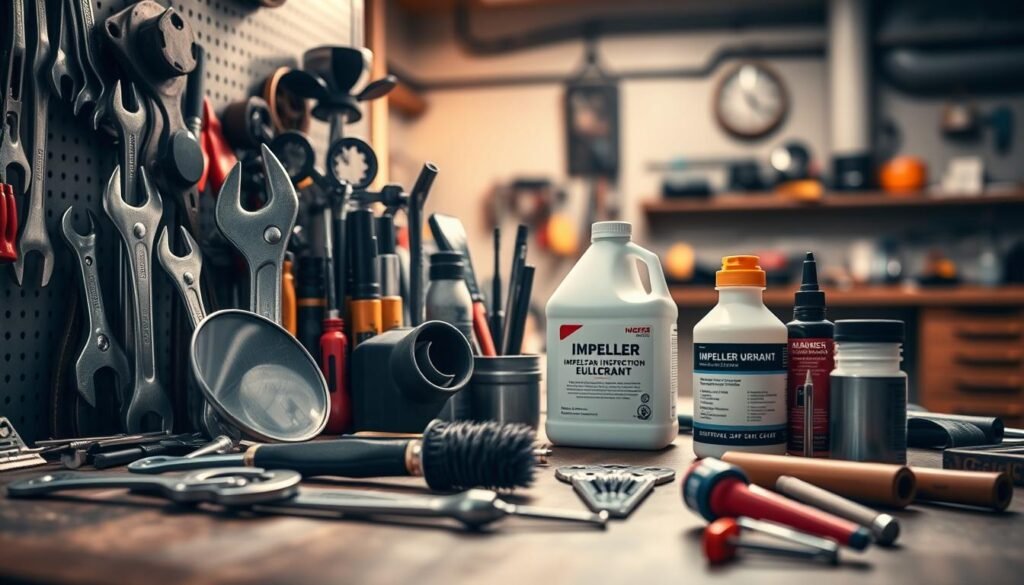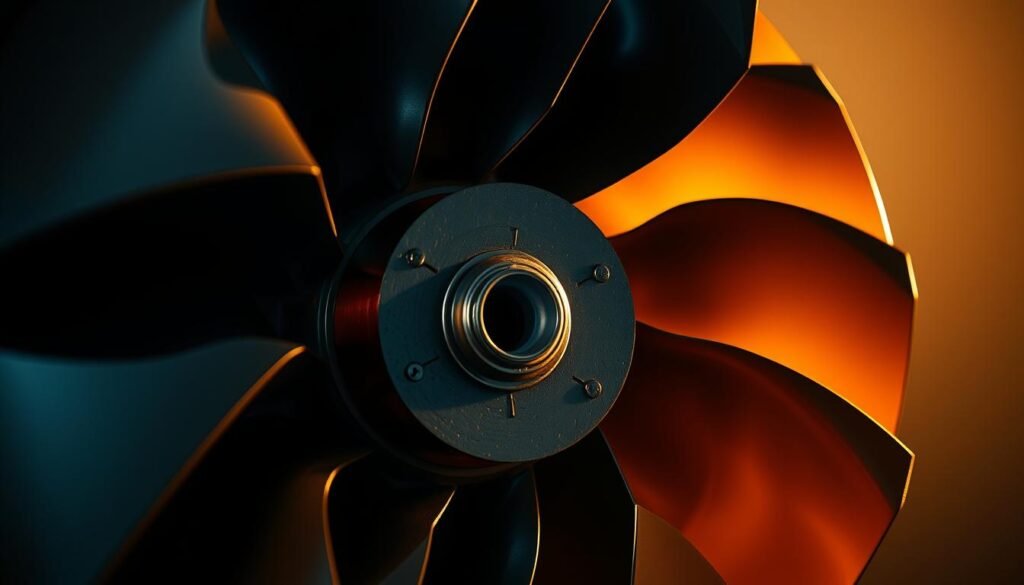Keeping the impeller in good shape is key to its long life and top performance. By sticking to daily maintenance tips, you can lower the chance of impeller failure. This saves money and boosts efficiency. It’s all about daily care and regular checks to catch problems early.
Having a daily maintenance plan can make your impeller last longer, avoiding expensive fixes. Simple steps like cleaning and oiling can stop wear and tear. Por aquí, you keep your system running smoothly, boosting productivity and cutting downtime.
Adding daily maintenance to your routine is a smart move. It cuts down on upkeep costs and keeps your system running well. Good impeller care is vital for less downtime and more work done. Regular checks help spot issues early, saving you from big repair bills.
Understanding the Critical Role of Impeller Maintenance
Impeller maintenance is key for a mechanical system’s system performance. Regular upkeep boosts efficiency and reliability. It cuts downtime and lowers costs. By focusing on impeller care, you save money and make your equipment last longer.
A well-kept impeller cuts energy use, boosts flow, and reduces vibration. Pero, ignoring maintenance can cause impeller wear. This leads to poor performance, more vibration, and noise. Look out for signs like:
- Decreased flow rates
- Increased energy consumption
- Excessive vibration and noise
Spotting these signs early helps avoid bigger problems. It keeps your equipment running smoothly. Regular checks also catch issues before they get worse, saving you from unexpected downtime.
In short, taking care of your impeller is essential. It keeps your system running well and saves you money. Regular maintenance and knowing the signs of impeller wear ensure your equipment works its best for longer.
| Maintenance Task | Frequency | Benefits |
|---|---|---|
| Visual Inspection | Daily | Early detection of impeller wear |
| Cleaning | Weekly | Improved system performance |
| Lubrication | Monthly | Reduced friction and impeller wear |
Essential Tools and Equipment for Daily Impeller Care
Para daily impeller care, the right maintenance tools y equipment are key. You’ll need basic tools like wrenches, pliers, and screwdrivers. Also, specialized gear like pressure gauges and flow meters is important.
For routine checks, cleanings, and fixes, you’ll need various maintenance tools y equipment. Some must-haves include:
- Pressure gauges to check system pressure
- Flow meters to measure flow rates
- Wrenches and pliers for adjustments
- Screwdrivers for part removal and replacement
- Cleaning solutions and brushes for debris removal
It’s also vital to know the daily impeller care steps and rules. This means understanding how to inspect and clean the impeller. Plus, knowing how to adjust or repair it when needed.

With the correct maintenance tools y equipment, and by following the right daily impeller care steps, you can make your impeller last longer. This keeps your system running well and efficiently.
Safety Protocols for Impeller Maintenance
Safety is key in any maintenance work, including impeller maintenance. It’s vital to follow strict safety rules. This means wearing protective gear like gloves, safety glasses, and a face mask to avoid injuries from debris or chemicals.
Lock-out/tag-out procedures are also critical. They stop the equipment from starting up by accident. This can prevent serious injuries or even death. These steps involve turning off the power and locking the equipment to keep it safe.
Personal Protective Equipment Requirements
Here’s what you need for impeller maintenance:
- Gloves to prevent hand injuries
- Safety glasses to protect the eyes
- Face mask to prevent inhaling debris or chemicals
- Steel-toed boots to prevent foot injuries
Lock-out/Tag-out Procedures
Follow these steps to avoid accidents:
- Turn off the power source
- Lock the equipment to keep it safe
- Use a tag to show it’s being worked on
Emergency Response Guidelines
Here’s what to do in an emergency:
- Call for emergency services right away
- Give first aid if needed
- Clear the area to avoid more injuries
By sticking to these safety rules, wearing the right gear, and knowing how to respond in emergencies, workers can stay safe during impeller maintenance.
| Safety Protocol | Description |
|---|---|
| Personal Protective Equipment | Wearing gloves, safety glasses, and a face mask to prevent injuries |
| Lock-out/Tag-out | Disconnecting the power source and locking out the equipment to prevent accidental start-ups |
| Emergency Response | Calling for emergency services, providing first aid, and evacuating the area in case of an accident |
Extending the Life of the Impeller Through Daily Inspection
Regular daily inspection is key to extending the impeller’s life. By adding a consistent maintenance routine to your daily tasks, you can lower the chance of unexpected downtime and expensive repairs. A well-kept impeller boosts system performance, leading to better efficiency and less energy use.
A daily inspection should start with a visual check of the impeller for wear, misalignment, or blockages. Look for unusual vibrations, noise, or performance changes. Also, keep an eye on the impeller’s operating conditions like temperature and pressure to make sure they’re in the right range.

To make sure the impeller lifespan is as long as possible, following a set maintenance routine is vital. This includes:
- Regular cleaning and lubrication of the impeller and its parts
- Checking the impeller’s blades and hub for wear or damage
- Ensuring the impeller is aligned and balanced for best performance
By taking these easy steps and adding a daily inspection to your maintenance routine, you can extend your impeller’s life. This reduces downtime and boosts system performance. Remember, a well-maintained impeller is key to your system’s efficiency and reliability.
| Inspection Task | Frequency | Importance |
|---|---|---|
| Visual examination | Daily | Alto |
| Operating condition monitoring | Daily | Alto |
| Cleaning and lubrication | Weekly | Medium |
Best Practices for Cleaning and Lubrication
Keeping the impeller in good shape is key. This means using cleaning techniques that avoid damage and lubrication schedules for the best performance. By doing this, you can cut down on downtime and lessen environmental harm.
Cleaning regularly stops debris and contaminants from building up. You can clean by hand or with special tools. Also, think about the environmental considerations when picking cleaning products and methods.
Proper Cleaning Techniques
- Use mild detergents and avoid abrasive materials
- Implement a regular cleaning schedule
- Utilize specialized equipment for hard-to-reach areas
Lubrication Schedules and Methods
Lubrication cuts down on friction and wear on the impeller. A good lubrication schedule can make the equipment last longer and save on maintenance costs. Choose the right lubricant for your needs.
Environmental Considerations
When you do maintenance, think about the environmental considerations. Use green cleaning products, dispose of waste right, and prevent pollution. Por aquí, you can reduce your environmental impact and keep your workplace safe.
| Maintenance Task | Frequency | Environmental Consideration |
|---|---|---|
| Cleaning | Weekly | Use eco-friendly cleaning products |
| Lubrication | Monthly | Proper disposal of used lubricants |
| Inspección | Daily | Implement measures to prevent pollution |
Conclusión: Maximizing Your Impeller’s Operational Lifespan
Daily maintenance is key to making your impeller last longer. By following the tips in this article, you can maximize efficiency y extend life. This includes regular checks, cleaning, and lubrication.
Staying safe and using the right tools is also important. This makes your maintenance work both safe and effective.
Creating a maintenance program for your system can save money. It also cuts down on the need for expensive repairs or new parts. Regular checks help spot problems early, so you can fix them before they get worse.
By sticking to the best practices from this article, you can extend your impeller’s life. This keeps your system running smoothly and saves you money. Make impeller maintenance a priority to boost efficiency, cut costs, and keep your equipment in top shape.
